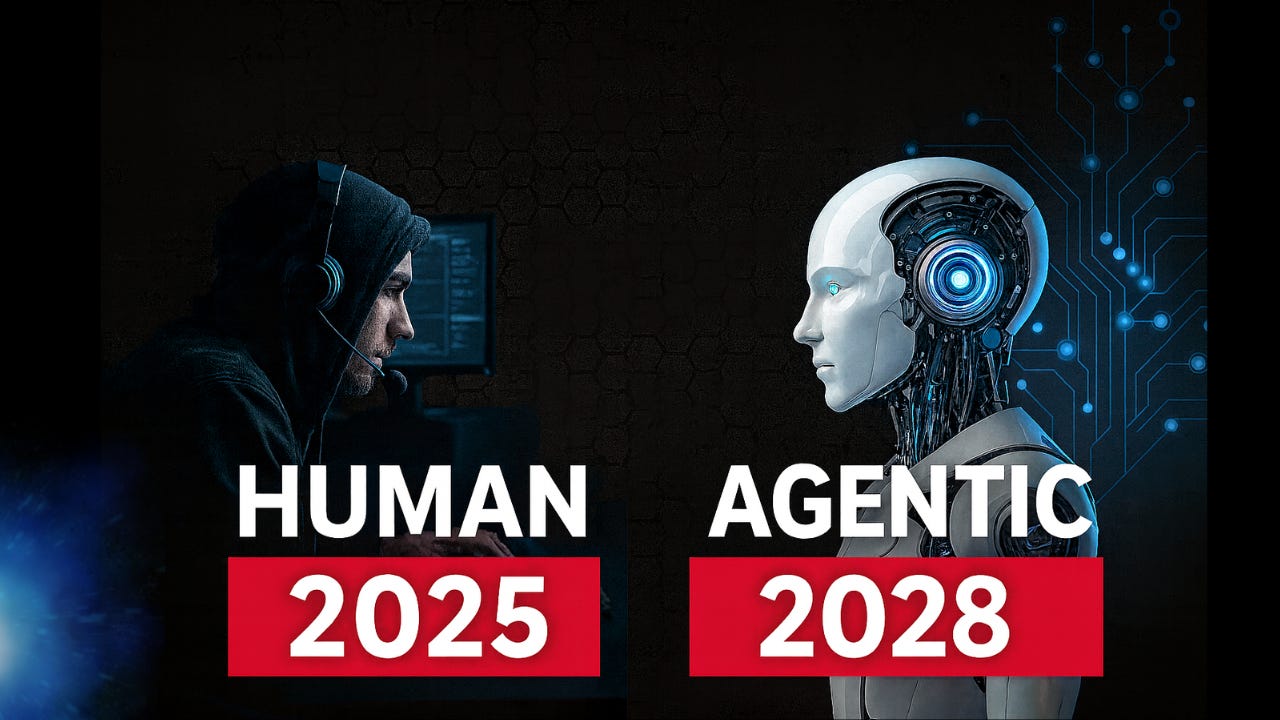Is Agentic AI Is Coming for The SOC Analyst Role ??
How To Future-Proof your SOC Skills in the Age of AI
When Ahmed finished his cybersecurity bootcamp earlier this year, he was excited to finally break into the industry.
He had studied SOC workflows, learned how to analyze logs, and practiced writing incident reports.
But as he scrolled through LinkedIn, his excitement turned to anxiety.
Every other post seemed to warn that Agentic AI was automating SOC work.
“AI can already triage alerts.”
“AI is replacing Tier 1 analysts.”
“80% of SOC tasks will disappear.”
Ahmed started to wonder: Was he training for a job that might not even exist in five years?
His story isn’t unique. Thousands of aspiring analysts are asking themselves the same thing.
Is the SOC still a viable career path, or is Agentic AI destined to win this fight?
The Security Operations Center (SOC) has long been the frontline of cybersecurity defense.
SOC analysts monitor alerts, investigate suspicious activity, and coordinate incident response.
But the rise of Agentic AI: autonomous, goal-driven AI systems capable of chaining tasks and adapting to new situations, is forcing a fundamental question: who will win the SOC of the future — humans or AI agents?
The answer isn’t as simple as “AI will replace humans” .. which is what a lot of people think of AI
Instead, the future SOC will likely be a hybrid battlefield where Agentic AI takes on repetitive detection and response tasks, while human analysts focus on context, strategy, and judgment.
Let’s break this down.
What Agentic AI Brings to SOC
Agentic AI is a step beyond traditional machine learning. Unlike static detection models, Agentic AI can act like an autonomous analyst, chaining together steps to investigate an alert, search for related activity, and even propose mitigations.
Here’s what it brings to the table:
1 — Speed and Scale
AI agents don’t tire. They can parse thousands of log lines per second across Logs, EDR, and SIEM tools.
Routine triage tasks .. like matching IPs to threat intel feeds, become nearly instantaneous.
2 — Autonomy
Traditional AI surfaces alerts. Agentic AI can act: run queries, pivot across datasets, or simulate attacker paths.
For example, if a login attempt looks suspicious, an AI agent might automatically check geolocation, user behavior history, and MFA logs — without waiting for a human to click through dashboards.
3 — Consistency
Humans overlook things under fatigue. AI applies policies the same way, every time.
This reduces false negatives in areas like phishing detection or insider threat monitoring.
4 — Cost Efficiency
A SOC with 24/7 staffing is expensive. Augmenting analysts with AI agents could reduce headcount or allow smaller firms to achieve enterprise-grade detection.
What SOC Analysts Still Do Better
It’s tempting to imagine AI sweeping the SOC clean of humans.
But here’s the catch:
Cybersecurity is as much about context and judgment as it is about logs.
1 — Understanding Business Impact
AI might flag an anomalous database query. But only a human understands whether it’s an intern testing a dashboard or an attacker exfiltrating crown-jewel data.
Context is critical. Without it, you get automation sprawl — alerts with no prioritization.
2 — Creative, Adaptive Thinking
Attackers constantly innovate. SOC analysts apply imagination — asking, “What if the attacker bypassed MFA by SIM-swapping?”
AI follows training data and rules. Humans improvise in uncharted territory.
3 — Legal and Ethical Decision-Making
Can you isolate a critical production system automatically? What if it disrupts patient care at a hospital?
These decisions require risk trade-offs, accountability, and liability — areas where humans must stay in control.
4 — Cross-Team Communication
No AI agent yet can persuade a CEO or calm regulators after a breach.
SOC analysts translate technical incidents into executive language: “This attack could stop payroll processing.”
The Future of SOC: Collaboration, Not Competition
The “AI vs SOC analyst” framing can feel like a cage match, but the future SOC is more like a tag team:
Tier 1 triage: Agentic AI will dominate. Low-value, repetitive tasks — log correlation, enrichment, first-response playbook execution — will move to AI agents.
Tier 2 investigation: A hybrid layer. Analysts use AI copilots to accelerate analysis but still interpret results.
Tier 3 hunting and response: Human-led, supported by AI for data crunching and simulation.
Think of AI as the junior analyst who never sleeps — fast, consistent, but lacking judgment.
Humans remain the senior analysts and strategists, steering the response and interpreting context.
Risks of Over-Reliance on AI in the SOC
Before declaring victory for Agentic AI, we need to acknowledge risks:
1 — Model Poisoning
If attackers poison training data, the AI might systematically ignore certain tactics.
Imagine an AI blind to a specific PowerShell technique because adversaries manipulated telemetry.
2 — Tool Misuse
Agentic AI relies on tool integrations. A compromised AI could misuse those tools — isolating the wrong systems or wiping evidence.
3 — Hallucinations and Overconfidence
LLM-based agents sometimes fabricate results. In a SOC, a “hallucinated” log correlation could waste hours of response time.
Humans must validate outputs.
4 — Accountability Gap
If AI takes an action that causes business damage, who is responsible — the vendor, the SOC manager, or the AI system?
Governance frameworks like NIST AI RMF and ISO/IEC 42001 stress the need for human-in-the-loop oversight.
What This Means for Your Career
For cybersecurity professionals, the question isn’t if Agentic AI will transform SOC work.
It’s already happening. The real question is: how do you adapt?
Here are practical steps:
1 — Master AI-Augmented Tools
Learn how SIEMs, SOAR platforms, and EDR tools integrate AI copilots.
Being the “AI-savvy analyst” makes you indispensable.
2 — Focus on Human-Exclusive Skills
Business risk translation, communication, and judgment can’t be automated.
Hone your ability to brief executives and regulators.
3 — Specialize in Adversary Simulation and Threat Hunting
AI handles routine alerts. Human hunters who think like attackers will always be in demand.
4 — Learn AI Security
New roles will open around securing AI systems themselves: preventing prompt injection, data poisoning, and model theft.
The SOC of the future won’t just defend infrastructure — it will defend the AI agents running inside it.
Who Wins?
So, back to our original question: Agentic AI vs SOC Analysts — who wins?
The short answer: both, if used wisely.
Agentic AI “wins” in speed, efficiency, and cost savings.
SOC Analysts “win” in judgment, creativity, and leadership.
The real losers will be organizations (and professionals) who try to ignore the shift.
A SOC without AI risks drowning in noise.
A SOC without humans risks making reckless, context-free decisions.
The winners will be the hybrid teams .. where analysts embrace AI as an ally, not a threat.
Think “Iron Man, not Terminator” .. humans augmented by AI suits, not replaced by them.
Conclusion
The SOC of the future isn’t man vs machine — it’s man and machine, working side by side.
Agentic AI will rewrite job descriptions, reshape SOC workflows, and challenge old models of staffing.
But the analysts who adapt i.e. learning to wield AI, leaning into human strengths, and specializing in areas AI can’t replace .. will thrive.





Great breakdown! Agentic AI excels at routine SOC tasks, but human judgment and strategy remain irreplaceable. For more AI trends and insights, check out my Substack.